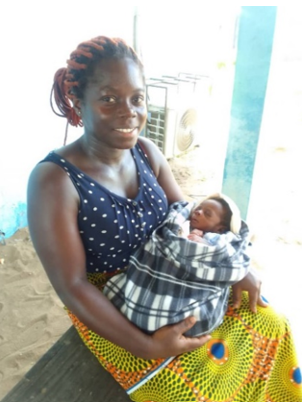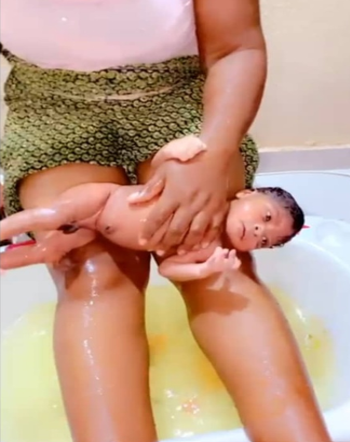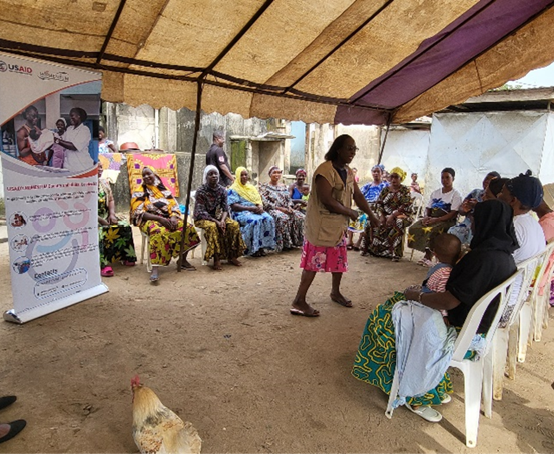It Starts in the Community: Improving Newborn Care in Côte d’Ivoire
Published on March 25, 2024
By Ayoka Cherifath Assogba, Communications Officer, with contributions from Georges Akpo, Community Health Technical Advisor, and Lohoré Kragba Kévin, Community Health Technical Assistant, MOMENTUM Country and Global Leadership Côte d’Ivoire

In Abidjan’s Biabou district, Miss M.K. emerges from the maternity ward with her first baby in her arms. Like other new moms, she faces a long list of tasks to learn in order to care for her newborn son—from bathing him to changing his diaper, taking care of the umbilical cord until it falls off, breastfeeding, cleaning his nose and ears, blowing his nose, clipping his nails, and more. “Because of my partner’s new job, we had to move to Abidjan, and I wasn’t able to bring a relative to assist me after the birth of my baby,” she says.
In Côte d’Ivoire, new mothers can choose to be supported by more experienced women, either relatives or close family friends or even professional baby washers. This cultural practice enables the mother to rest after childbirth. The baby washers are volunteers, and are recognized by community members as having special and much in-demand expertise on caring for newborn babies.
Diomandé Bintou is a baby washer in Biabou district who helps new mothers in caring for their newborns. She recently took part in a learning course for adult and teenage mothers, called Mothers’ Classes, funded and supported by MOMENTUM Country and Global Leadership.

The course consists of a series of nine classes led by mentor Ziri Pascale. A community leader, former community health worker (CHW), and influential woman in her neighborhood, Ziri has been a mentor on the MOMENTUM project for two years. She suggested that Diomandé should attend the sessions to improve her skills given her role and impact on the community.
During these classes, women discuss important parts of planning for birth – such as creating a birth plan, understanding when to go to a health center, and what kinds of danger signs to watch out for. They also learn how to care for their baby after it is born, including exclusive breastfeeding and when to go in for neonatal consultations. Participants also learn about family planning and contraceptive methods, and how to prevent closely-spaced pregnancies after childbirth.
Sessions are mostly attended by new mothers, but the baby washers were included given the important role they play in the community.
Thanks to her regular participation in these Mothers’ Class meetings, Diomandé says she has improved her newborn care practices: “…Since I’ve taken part in the coaching, we’ve followed the advice. Today, I advise my young pregnant sisters to go to the health center and take the medicines prescribed there. We’ve never slept under a mosquito net, but thanks to this advice, we now use them. She told us a lot of things… even vaccinations for children up to the age of 5… we didn’t do that. But today everything is going to change.”

They also follow up with new mothers to ensure they return to the health facility for medical care and keep up with postnatal appointments and vaccinations, and support the new mothers to help them follow the advice given by the midwives. As a woman who is well listened to in the community, she also facilitates the use of contraceptive methods by her willing peers by reassuring husbands of the benefits of family planning.
Diomandé has become an important connection between health facilities and mothers in the community.

MOMENTUM in Côte d’Ivoire has conducted 519 mothers’ classes like the ones Diomandé attended, reaching 6,384 pregnant and breastfeeding women. These classes are an important part of MOMENTUM’s overall work in the country. The project works hand-in-hand with the Ministry of Health, local partners, and community leaders to improve the quality of maternal and newborn health services by building on existing community systems.

